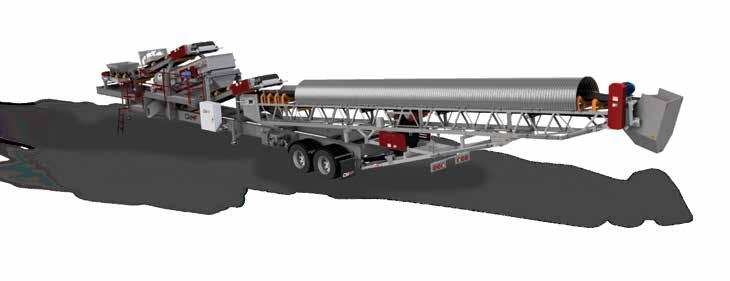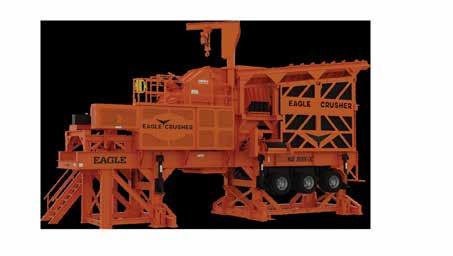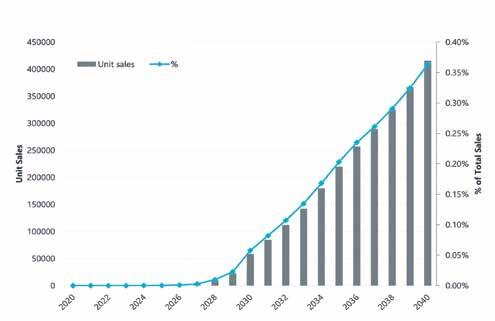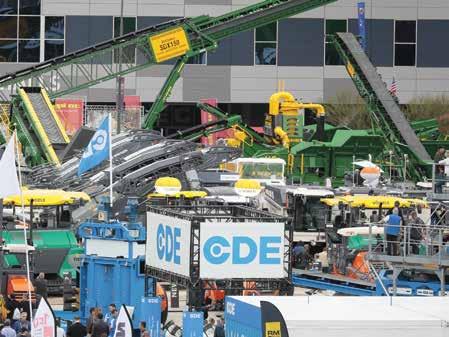
4 minute read
Lift Your Operations Out of the Stone Age
Apex Scale Ticketing Software combined with simple site automation technology gets your trucks in and out in record time.
With Apex You Can:
• Eliminate gaps in communication between dispatch and back office
• Simplify quote-to-cash processes by integrating with ERP
• Reduce time at plant by streamlining and automating your processes
• Reduce errors throughout your entire order cycle with digital tickets
• Capture complete visibility to make more accurate decisions, quicker
• Support business growth with one reliable, scalable, and maintainable system burning some of the volatiles out,” Wilson said. “That’s why we are replacing them with a quality rejuvenator and polymer modifier at the end of the process.”
The rejuvenating agent is added just ahead of the paver, chemically reacting with the material. Finally, after adding and mixing the rejuvenating agent, the windrow of material is picked up with a conventional windrow elevator, modified by Dustrol. The paving of the recycled material is done with a conventional electronic grade control/electric screed paver, in Butler County, using Dustrol’s Bomag Cedarapids CR662RM rubber-tracked paver.
The material is compacted using conventional rollers. The road can be opened to traffic after a cool-off period similar to an asphalt paving operation, typically within an hour after the process is complete.

“Our equipment can go from 13 to 16 feet wide,” said Donn Johnson, consultant for Dustrol. “In this application we are working 12 feet wide. It’s originally a 22-foot roadway and they’ve added a foot to either side, which is recycled in-place, so we will wind up with a beautiful 24-foot pavement after processing.”
“We make all our own equipment, the heaters, of course,” Wilson said. “The pavers and rollers are conventional. We modified the windrow elevator because we can’t really find a windrow elevator we like well enough, so we extended it upward, so it dumps in the paver a little differently. We tend to modify just about everything, but the heaters, heater-tractors, milling drums, even the scarification equipment is all built by us. We manufacture for ourselves and do our own construction.”
The preheater/heater-miller/heater-scarifying/tunnel heater system allows Dustrol to reduce project costs and improve project timeliness. “We do everything on-site,” Johnson said. “We don’t haul materials off for mixing or processing. This speeds up timelines and reduces our fuel consumption, in turn providing lower-cost maintenance for removing cracks, ruts and low areas on existing surfaces, as well as offering environmental advantages like much lower fugitive dust emissions during reconstruction.”
Traffic delays are minimal as the process is fast at 20 to 40 fpm, allowing the contractor to repair 2 to 4 lane-miles per day.
“Dustrol can complete the HIR process as either a single-lift or multiple-lift rejuvenation,” Wilson said. “In the single-lift method, scarifiers loosen the heated material to a depth of up to 1 inch. The multiple-lift operation allows for the rejuvenation to go to 2 inches or more using milling heads to loosen the material.” Both processes allow surfacing to be placed the same day, or up to weeks later if necessary.
Destructive Loadings
On Butler County roads, passenger cars don’t provide the kind of destructive loading that causes pavements to deteriorate, nor do most agricultural hauls of hay or harvested products if they are distributed over the proper number of axles, Butler County’s Riherd said. But large-scale cattle and hog confinement operations generate hauls of manure that are taken to fields as fertilizer and are very heavy.
“The hauls of manure are pretty hard on our roads,” he said. “Additionally, recent legislative action has permitted the allowable axle weights to increase, which will undoubtedly cause our roads to wear much faster than they do with today’s axle weights.”
“One of the biggest variables in our system is pavement age,” said Butler County’s Riherd. “Nearly every road in the county has the same base, and it has the same weather and same traffic. So, a lot of what we do is age-based. We don’t have a formal pavement management program; instead, we have a starting point in which we know which roads are of a certain age. We will drive them and see what the crack count is, and how the ride is.”
The pavement condition then is measured, but without a great deal of variance among pavements. “We don’t have a red spot on the map for bad conditions, or orange or green or whatever the color is. Instead, most roads have the same characteristics regarding pavement condition index. We stay aware of their condition as we have a reasonable assumption that we’re going to have this many dollars to spend in the next five years. We ask, ‘where will we spend this money?’”
A main source of revenue for Butler County’s rural roads is the Iowa Farm-to-Market road account. “That’s a road use tax funding coming from the state fuel tax and vehicle registration fees,” Riherd said. “It’s a formula based on your area, your number of road miles, and it’s distributed throughout the state. Another source would be federal aid on a portion of our system, that is programmed through our region. But most of the time our farm-to-market account is what we use.” The county’s annual secondary road budget is around $8 million to $9 million.
Riherd said none of this would be possible without the confidence and support of the county’s board of supervisors.
“We have a very supportive board of supervisors who are the elected leadership of the county, and they’re ultimately responsible to the taxpayers,” he said. “They’re the ones who determine the tax levies in the county and recycling is important to them because it makes the best use of our tax dollars.
“And that’s what we’re attempting to do here as well, make the best use of our tax dollars, building a good road that will last many years,” he added. “What might be a small maintenance project is more of an investment in a high-quality road that the supervisors can be proud of.”
Edited from editorial content provided by Dustrol Inc. This article previously appeared in Pavement Preservation Journal. Used with permission weilerproducts.com
From innovative designs to Caterpillar dealer service and support, Weiler is paving the way to success for contractors across North America. Weiler material transfer vehicles, commercial pavers, road wideners, windrow elevators, compactors, soil stabilizer, rock drills, grader, screeds and tack distributors are engineered with proven features to increase productivity while reducing operating costs. Weiler equipment is sold and serviced exclusively at Caterpillar dealers throughout North America, providing unmatched support with factory trained technicians and readily available parts to keep your operation up and running.











